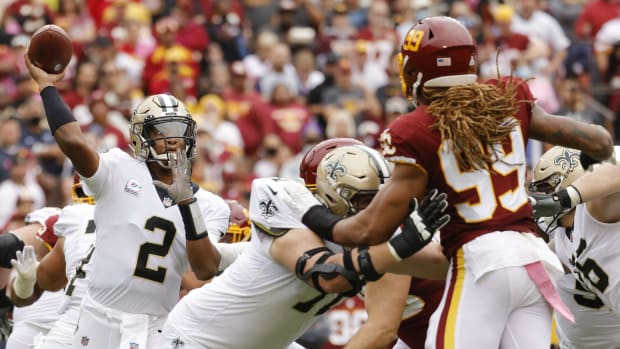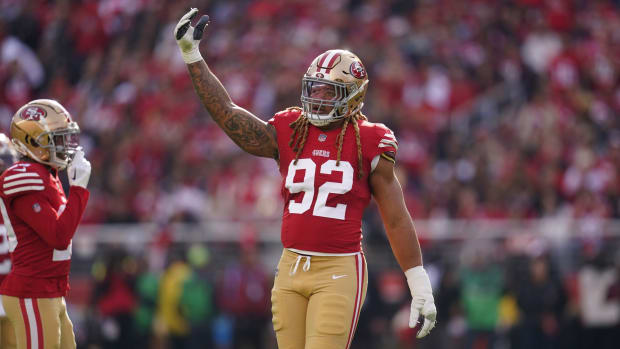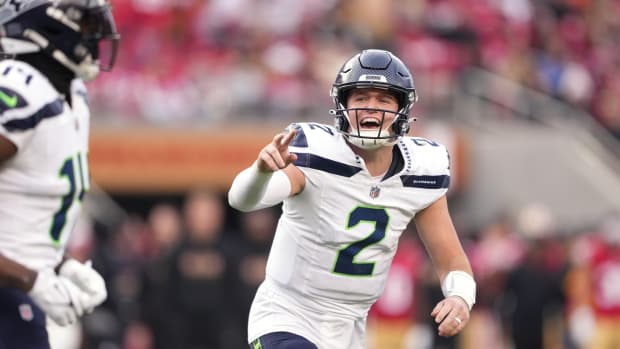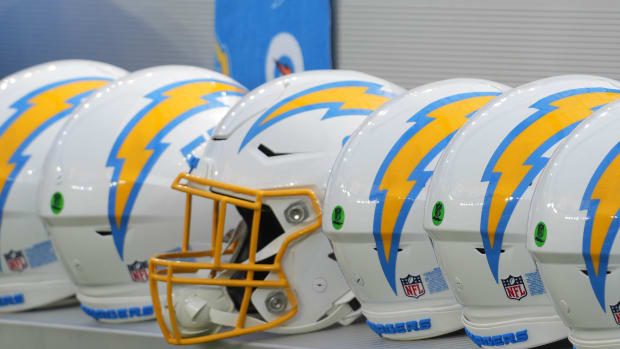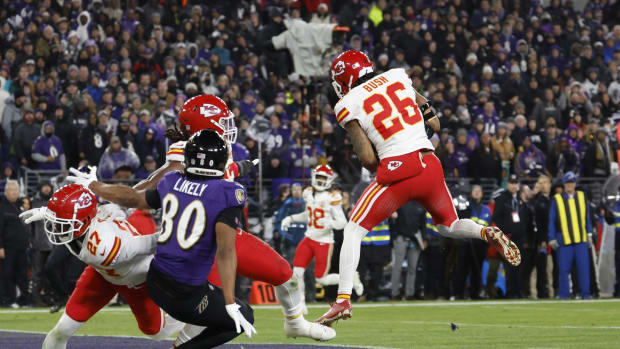RGIII a lock to be ready for opener; Father's Day book guide; more
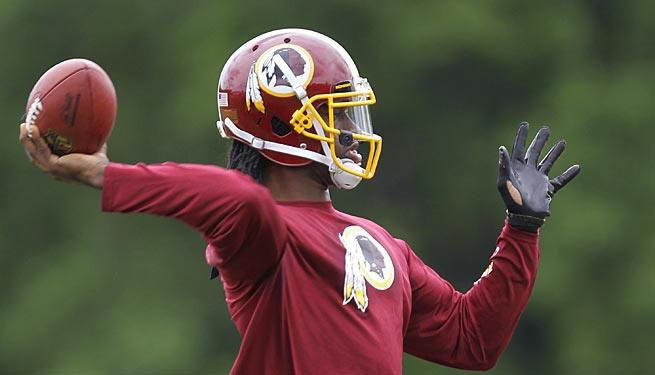
Robert Griffin is optimistic he'll be ready for the Redskins' season opener in September.
Luis M. Alvarez/AP
Do not get your father a tie this week. Get him a book.
Now for the Father's Day book section. I've been doing this for a few years, in part because we need to find more excuses to read in our lives, and in part because your father, brother, uncle and grandfather all told me last week they were dying for a good book for Father's Day.
Last year in this list I gave you The Art of Fielding, and before that Unbroken ... two of my favorite books ever. I don't have one I love as much this year, but I have several I like very much. I wouldn't put one on here that I wouldn't recommend to a good friend.
Billy Lynn's Long Halftime Walk, by Ben Fountain (Ecco/HarperCollins).
Thanks to Gregg Rosenthal for pointing this out to me; I'd missed this National Book Award finalist when it came out in mid-2012. It's a terrific story of a platoon of Iraqi soldiers -- led by the focal character of the book, 19-year-old Army soldier Billy Lynn, of Stovall, Texas -- that gets captured on tape by an embedded FOX TV crew wiping out some insurgents who'd put their platoon under fire. The video makes the men heroes, and the Army flies them back to the States to send them on a two-week ain't-this-war-grand tour of malls and monuments and cities, culminating in a garish display of Texas-sized patriotism during the Cowboys-Bears Thanksgiving Day game in Dallas.
First thing I thought: Wait -- a novel on men being paraded around as heroes? Isn't there enough of a chance to parade real soldiers around? I am an avowed amateur at the feelings and moods of 19- and 20-year-old kids thrust into life-and-death, kill-or-be-killed situations, though I did stay at a Holiday Inn Express last night. But I did tour Afghanistan for five days in 2008 with the USO, and met quite a few 19- and 20-year-old kids thrust into situations like these men were. And darn if these characters don't seem exactly like some of the soldiers I met. Ben Fountain does a brilliant job capturing their hopes and dreams, many of which seem to be crushed by this patriotic tour.
This is my favorite book of the group. As I read, I felt that Fountain could write about anything and use dialogue and scene-setting and make something fictional incredibly realistic. This, I suppose, is the mark of a great writer. Speaking of writers, I guffawed at how he described the assembled media there to interview the hero soldiers in a press opportunity at the Cowboys game:
They don't even have to take notes, just hoover up his words with sleek little recording gadgets that look like protein bars. Merely by standing there they manage to be incredibly annoying, a middle-aged bunch of mostly big-assed white guys dressed in boring as hell business casual, such a sad-f--- sampling of civilian biomatter that for a moment Billy is actually glad for the war, hell yes, so much better to be out here shooting guns and blowing s--- up and shuffling around like scenery on a bad sitcom. God knows the war sucks, but he sees no great appeal in these tepid peacetime lives.
Gee, I always knew my life was important!
These heroes, time and again, are asked what it feels like to be heroes, and the real answer is the less than four minutes that it took to slaughter the attackers, they were just doing what they'd been trained to do. That plus the fact that they'd have been the ones slaughtered if they didn't act fast and attack the enemy. But over and over total strangers come at them and tell them what AMAZING AMERICAN HEROES they are, so that at the end of the Cowboys game, when they prepare to re-deploy, most of them actually want to leave and return to the front.
They'd been part of the halftime show, alongside Beyonce, and used as props by the Cowboys owner (a satirical Jerry Jones-a-like), and it was absolutely not what they'd hoped a day at the football game would have been. One of the soldiers, alongside friend Crack in the car leaving the stadium, says to the limo driver to hustle up, let's go, vamoose.
"Before they kill us,'' Crack seconds. "Take us someplace safe. Take us back to the war."
You'll find this 307 pages of your time very well-spent, I believe.
***
Wave, by Sonali Deraniyagala (Knopf).
This is a memoir, a compelling and very tough book to read. I know I have never read a book about loss and grief -- numbing grief, year after year, over the nearly eight years the tale encompasses -- such as this. It's also one of the most interesting books I've read in a long time.
On Dec. 26, 2004, a tsunami hit the coast of Sri Lanka. There at a Sri Lankan National Park was the author, a professor, with her husband, Steve, and children, Vikram and Malli, and her parents. The tsunami that killed some 230,000 in several countries claimed five members of this family. Everyone but the author, the mother whose life was devoted to so many things, but first to take care of her children.
You know there's something bad coming when the first sentence of the book is, I thought nothing of it at first.
The description of what happened is wrenching. The aftermath of not knowing where your family is is wrenching. The accounts of waking up every morning without them are wrenching.
Just imagine if, in the span of two minutes, you go from your little 7-year-old reading the first pages of The Hobbit and staring out at the sea eagles in the distance, your other boy playing with Christmas presents, your husband reading in the bathroom, parents relaxing in the next room. And a friend tells you she wants to start a family soon because, "What you guys have is a dream,'' a life being as placid and normal and perfect as it can be ... to jumping into a Jeep and speeding away and trying to get away and -- well, I don't want to do the spoiler act here. But the tsunami is random, cruel, vicious and deadly.
Deraniyagala lives the next few years alternating between trying to move on with her life, drinking way too much, trying to bury the past, trying to remember every second of the past. It's harrowing. Even four years later, she pines achingly for her kids, with guilt:
I let my children go, when I was their mother ... I wasn't there when they most needed me. I know I was too powerless in that raging water to get to them, not that I knew where they were. Even so, I failed them. In those terrifying moments, my children were as helpless as I was and I couldn't be there for them and how they must have wanted me. Their helplessness I can't bear to consider, just as I turn away from the memory of Vik crying in fear as we sat for a few minutes in that Jeep before the water filled up. How can I hold the truth of being their mom when I have all this to live with? There's more. I didn't even look for them. After the water disappeared I let go of that branch, and I didn't search for my boys ...
On and on it goes. So emotional. So real. If you can take the pain, I recommend it. Wave is unforgettable.
***
Sutton, by J.R. Moehringer (Hyperion).
Mike O'Hara told me to read this book, and when Mike tells me to do something, I just do it. I've known the former Lions beatman for three decades, and he is a trustworthy soul. So the day he told me to get it, I ordered it on Amazon. It took me three nights to read. The only reason it didn't take me one is I didn't want the next day to be wasted for lack of sleep.
Willie Sutton is probably America's most famous bank robber in history. He robbed about 100 banks in a 25-year career starting in the late 1920s until the '50s, and spent half his adult life in prison. He got out for the last time on Christmas Eve 1969 and, incredibly, agreed to spend the next day, Christmas, with a reporter and photographer for a New York newspaper, visiting the places where he robbed, was caught, loved, hid and robbed some more. Wrote Moehringer:
The resulting article, however, was strangely cursory, with several errors -- or lies -- and few real revelations. Sadly, Sutton and the reporter and the photographer are all gone, so what happened with them that Christmas, and what happened to Sutton during the preceding sixty-eight years, is anyone's guess.
This book is my guess.
It's also my wish.
Moehringer writes 327 pages without a quotation. Historical fiction is what it's called. As he says in the beginning, it's his wish -- and mine, too, because it's so compelling.
Amazing to read so vividly of bank-robbing and escaping and robbing some more, and a New York judge -- Moehringer believes -- chastising Sutton when he sentences him to 50 years in 1932 for a spree of bank and jewel robberies.
Willie on the bus to Sing Sing. February 1932. He can still hear the words of the judge echoing off the marble pillars in the moon-pale walls of the courtroom.
Sutton you are the type of criminal whose misdeeds have shocked the American people. You are regarded by the police of New York as one of the most dangerous men ever to prowl our streets. In point of daring, defiance of law, absolute disregard of property in life, your crimes are among the most brazen ever committed in this city. When we read about holdups of this kind in the old West, we marvel. We say such crimes could no longer exist. But you were the equal of those bygone desperadoes ... My duty is clear. Though you're only thirty, I must sentence you to a period of time greater than you are years of age. Fifty years.
That's the way the life story of Willie Sutton is told -- with some evidence and some clues, but the best guess of Moehringer as to how things really did go down. The robberies and the costumes and the disguises and the surprising minimum of violence. I always love the way history collides with events from other walks of life. Sutton walked out of Attica five days after Joe Namath and the New York Jets, the defending world champs, played their final game in American Football League history. On that exact day, Curt Flood challenged the reserve clause in baseball, leading to the revolution of free agency. I wonder how big a deal it was that Willie Sutton got out of jail. Reading Moehringer, it sounded very big indeed. We'll never know how true his read of the situation is, but Moehringer tells a great story.
***
The Racketeer, by John Grisham (Doubleday).
I am a sucker for all things Grisham (Harlan Coben too, though I haven't gotten to Six Years yet). Have been since A Time To Kill. What I love about The Racketeer is how tough it is to figure out until the end. Many times in Grisham books, you get about halfway into them and have a good idea who did it or the reasons it was done. In this one ... I have to admit Grisham did a heck of a job writing a different book with a different ending.
Usually, he's preaching about some form of the law, with the underpaid lawyer working to right one of The Man's serious wrongs. In this one, a disbarred and jailed lawyer is the protagonist, and the machinations that lead him to a new life and to run circles around the FBI to acquire that new life are told tightly. It's a page-turner.
In fact, there's a phony documentary, millions in gold bars, a philandering-turned-dead federal judge, a few trips to Jamaica, a badly fooled former meth dealer ... In other words, good times, good killings, good and twisted plot.
***
The National Forgotten League: Entertaining Stories and Observations from Pro Football's First Fifty Years, by Dan Daly (University of Nebraska Press).
We don't appreciate pro football history. We never have. We know so much more about the old baseball players, the old boxers, and the old basketball players than we do about the footballers of the '30s, '40s and '50s. Sad, really. Did you realize that, after a quarter-century of pro football, Don Hutson retired with nearly three times the number of catches, yards and touchdowns of any who'd ever played? Or that in 1943, Sammy Baugh led the league in passing accuracy, average yards per punt and defensive interceptions? I mean, the man played defensive back and intercepted 11 balls. That's the greatest year a football player has ever had. Has to be. But few people know it.
RGIII looks good.
Saw him sprinting on Thursday.
Opener? A lock.
































